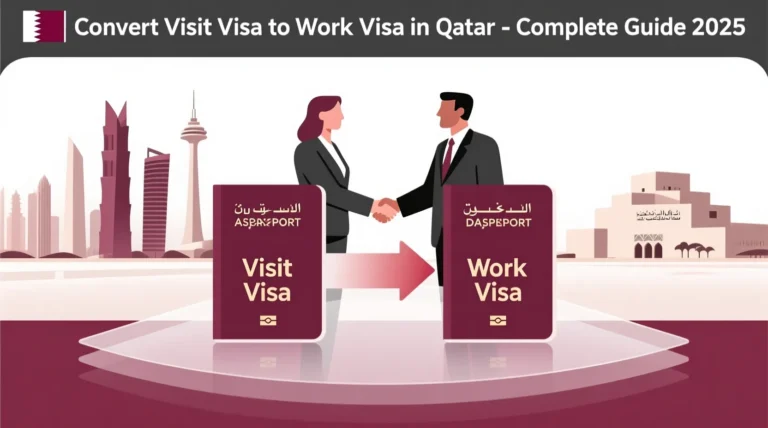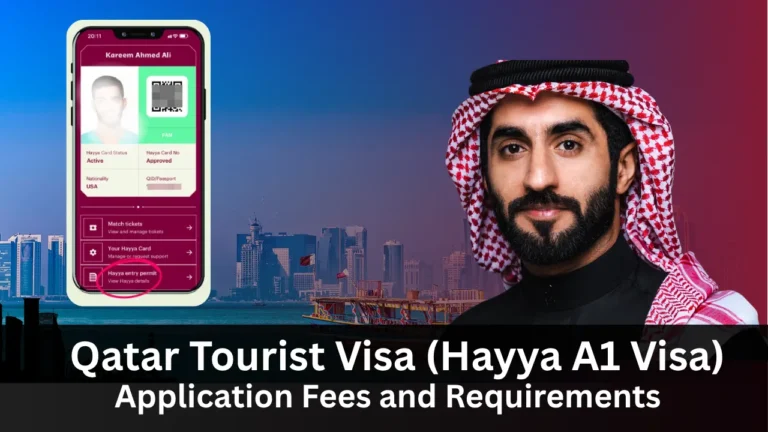What is a Saudi Iqama?
A Saudi Iqama is the official residency permit for foreign workers living in Saudi Arabia. It is issued by the Ministry of Interior and holds all your important details name, nationality, employer, profession, and validity date. Without it, you cannot legally work, travel within the GCC, or apply for certain visas, including entry to Qatar.
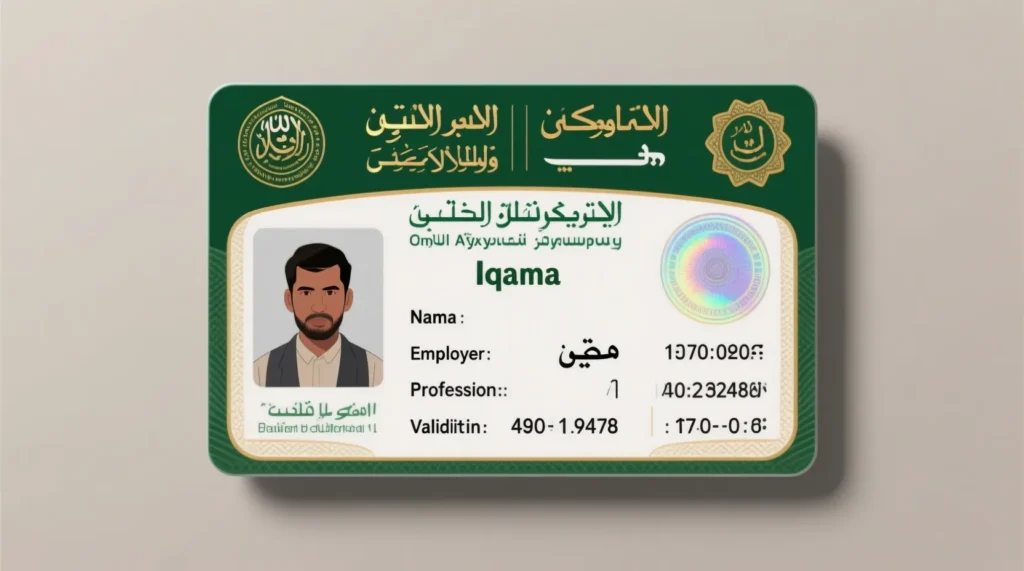
I’ve seen first-hand how important it is to keep your Iqama valid. A few months ago, one of my family members planned to visit Qatar for a business meeting. Everything was ready, but his Iqama renewal got delayed. At the border, he was stopped and told he couldn’t enter Qatar until the renewal was completed. It was a stressful situation that could have been avoided with an early check. My personal advice always review your Iqama expiry date at least one month before any travel.
Your Iqama not only proves your legal status in Saudi Arabia but also unlocks travel benefits in other GCC countries. For Qatar, it often means faster visa processing and, in some cases, eligibility for a visa on arrival.
Can Saudi Iqama Holders Travel to Qatar?
Yes, Saudi Iqama holders can travel to Qatar, but it depends on a few conditions. Your nationality, profession listed on the Iqama, and the validity of your documents all play a role. Qatar allows many GCC residents to enter through Visa on Arrival or an e-Visa, but each category has its own rules.

For example, if your profession is on Qatar’s approved GCC list, you may get a visa at the Abu Samra border within minutes. If not, you’ll need to apply online through the Hayya platform or at the Qatari embassy before traveling. I remember a friend who works as an engineer he crossed into Qatar by road and got his visa on arrival in less than 15 minutes. Another colleague, whose profession wasn’t on the list, had to wait a week for an e-Visa approval.
The key takeaway is simple: check Qatar’s latest GCC resident entry rules before you travel. Rules can change, and what worked last year might not work today. Being prepared means avoiding delays, extra costs, and unnecessary stress.
Types of Qatar Visas for Saudi Iqama Holders
Saudi Iqama holders have several options when entering Qatar. Each visa type has different rules, costs, and benefits. Choosing the right one depends on your purpose of travel, how long you plan to stay, and whether your profession is eligible for faster entry.
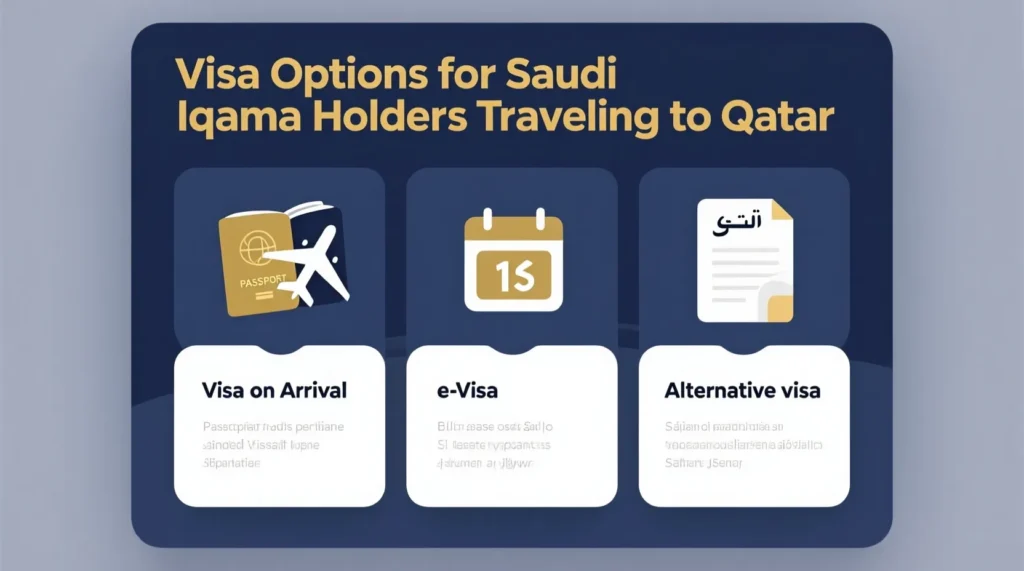
1. Visa on Arrival (VOA)
Many Saudi Iqama holders can get a visa at the Abu Samra land border or Hamad International Airport. It’s quick, but only for those whose profession is on Qatar’s approved GCC list.
- Eligibility: GCC residents with eligible professions.
- Documents: Valid passport, valid Saudi Iqama, return ticket, hotel booking, and sometimes travel insurance.
- Validity: Usually 30 days, extendable in some cases.
Tip: If you plan to cross by road, avoid weekends and public holidays, queues at Abu Samra can get long.
2. Qatar e-Visa / GCC Resident Visa
If your profession is not on the VOA list, you can apply online before traveling. The process is handled through Qatar’s official e-Visa system or the Hayya platform.
- Processing Time: 3–7 working days.
- Best For: Tourists, family visits, and residents who don’t qualify for VOA.
- Benefit: Approval before travel means peace of mind at the border.
3. Hayya Tourist or Family Visit Visa
This visa works well if you’re visiting family or coming for tourism events like Formula 1 or football tournaments.
- Eligibility: GCC residents and international visitors.
- Validity: Usually 30 days, with possible extensions.
- Special Feature: Sometimes grants free public transport during events.
4. Qatar Business Visa
For business meetings, trade events, or official company visits.
- Eligibility: Must have an invitation from a Qatari company or organization.
- Validity: Short-term (72 hours to 1 month), depending on the approval.
5. Qatar Transit Visa
If you’re just passing through Qatar for a connecting flight or short road stop, this visa allows a stay of up to 96 hours.
- Eligibility: Must show proof of onward travel.
- Cost: Often free, but must be pre-arranged for air travel.
Personal Insight: My cousin once opted for a VOA but got stuck because his profession had recently been removed from the list. He had to apply for an e-Visa from the nearest internet café in Saudi, delaying his trip by two days. Always check Qatar’s latest eligibility list before setting off.
Step-by-Step Process for Applying for a Qatar Visa
The process depends on which visa you’re applying for. Whether you choose a Visa on Arrival, an e-Visa, or a Family/Business visa, being prepared saves time and avoids last-minute surprises.
Applying for Visa on Arrival (VOA)
- Check eligibility – Make sure your profession is on Qatar’s approved GCC list.
- Prepare documents – Valid passport, Saudi Iqama, return ticket, hotel booking, and travel insurance (if required).
- Travel to Qatar – By road through the Abu Samra border or by air to Hamad International Airport.
- Pay the fee – Usually payable at immigration counters.
- Receive your visa – Printed directly in your passport.
Tip: If crossing by road, aim for early morning or late evening to avoid long border queues.
Applying for a Qatar e-Visa / GCC Resident Visa
- Visit the official Hayya platform or Qatar e-Visa portal.
- Create an account and fill in your details exactly as in your passport and Iqama.
- Upload documents – Passport copy, Iqama copy, photo, accommodation proof, and travel insurance.
- Pay the fee online using a card.
- Wait for approval – Usually 3–7 working days.
- Print your visa – Carry a hard copy and a digital copy while traveling.
Applying for a Family or Business Visa
- Get an invitation – From a Qatari resident, family member, or business partner.
- Prepare required documents – Invitation letter, passport, Iqama, photo, and travel details.
- Submit application – Online through the Hayya platform or at the Qatar Embassy in Saudi Arabia.
- Pay the fee – Based on visa type and duration.
- Wait for approval – Times vary from 5–14 days.
- Travel with your approval letter – Present it at immigration for entry.
Documents Required for Qatar Visa for Saudi Iqama Holders
Having the correct documents ready before you apply will make your Qatar visa process faster and smoother. Immigration officers and the Hayya platform are strict even one missing or outdated document can cause delays. Below is the complete, updated checklist every Saudi Iqama holder should prepare.
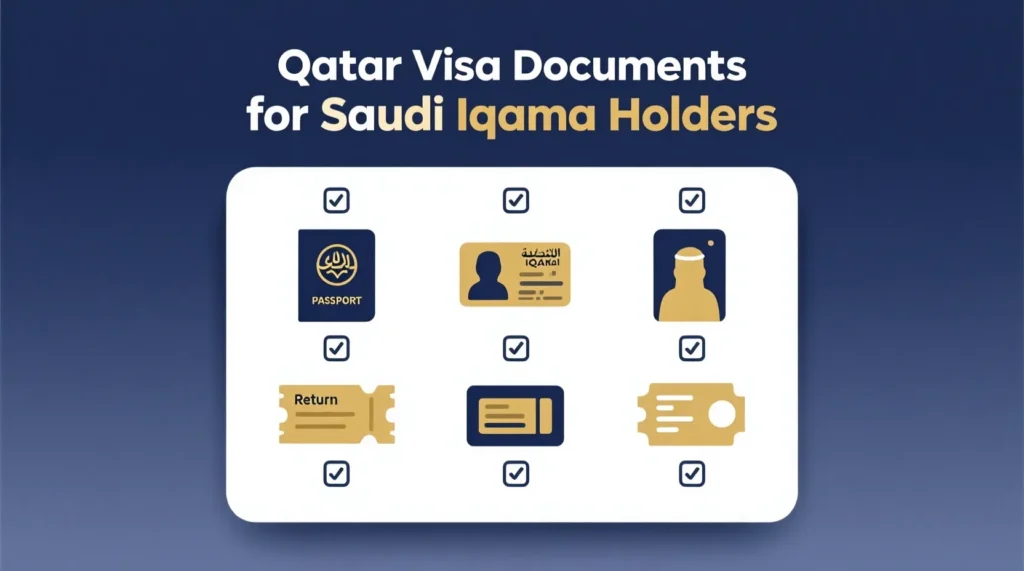
1. Valid Passport
- Must be valid for at least six months beyond your planned travel date.
- Should have at least two blank visa pages.
- If your passport is damaged, renew it before applying.
Extra Note: Some travelers have been denied boarding simply because their passport had less than six months of validity, even if the visa was already approved. Always check this first.
2. Valid Saudi Iqama (Residency Permit)
- Issued by Saudi Arabia’s Ministry of Interior.
- Must remain valid during your entire stay in Qatar.
- Profession on the Iqama matters for Visa on Arrival eligibility.
Tip: If your Iqama renewal is in process, wait until you receive the updated card before applying for the visa.
3. Passport-Size Photograph
- Taken within the last 6 months.
- White background only.
- High resolution, without shadows or filters.
Tip: Qatar’s e-Visa system often rejects selfies or casual mobile photos. Studio photos work best.
4. Accommodation Proof in Qatar
- Hotel booking confirmation.
- Or, a signed invitation letter from a Qatari resident with a copy of their QID (Qatar ID).
- Airbnb or rental contracts are sometimes accepted if booked through verified platforms.
5. Return or Onward Ticket
- Required to prove you won’t overstay.
- Can be a flight ticket, bus booking, or any confirmed onward travel.
Tip: If traveling by road, keep your Saudi exit/re-entry approval ready for inspection at the Abu Samra border.
6. Travel Health Insurance
- Mandatory for most visas.
- Must cover the full duration of your stay in Qatar.
- Should include emergency medical coverage.
Tip: Qatar has approved insurance providers listed on its Ministry of Public Health website using one of them can speed up visa approval.
7. Exit/Re-Entry Visa from Saudi Arabia
- A digital approval from Saudi immigration that allows you to leave and return.
- Especially important for residents traveling by air.
8. Optional but Strongly Recommended Documents
- Bank statement (last 3 months) to show financial stability.
- Company letter confirming your employment (for business visits).
- Copy of GCC Resident Eligibility List to prove VOA eligibility.
- Invitation or event ticket (for sports events, exhibitions, or family gatherings).
Qatar Visa Fees and Processing Time for Saudi Iqama Holders
Visa fees and approval times for Qatar vary depending on the visa type, your profession, and the method of application. Some options are fast and almost instant, while others require a few days or even weeks of processing.
1. Visa on Arrival (VOA)
- Fee: Usually free for most eligible GCC residents, but a small service fee (~QAR 100) may apply in certain cases.
- Processing Time: Immediate at the border, typically 5–15 minutes if documents are in order.
- Extra Tip: Border processing is quicker early in the morning or mid-week.
2. Qatar e-Visa (via Hayya Platform)
- Fee: Around QAR 100–150 (varies depending on purpose and duration).
- Processing Time: 2–5 working days. In busy seasons, it can take up to 10 days.
- Payment Method: Online by credit/debit card during application.
3. Family Visit Visa
- Fee: QAR 200 per month of stay (plus QAR 50 for each dependent).
- Processing Time: 5–7 working days.
- Note: The visa duration can be extended for up to 6 months for close family members.
4. Business Visa
- Fee: QAR 200–300 depending on the type (single or multiple entry).
- Processing Time: 3–7 working days if applied through a Qatari sponsor/company.
5. Qatar Transit Visa
- Fee: Free for short transits (up to 96 hours).
- Processing Time: 1–3 working days if applied online through Qatar Airways or official portals.
Qatar Visa Rejection Reasons and Solutions for Saudi Iqama Holders
Even if you meet all the eligibility requirements, Qatar can still reject your visa application. Knowing the common reasons and how to avoid them can save you time, money, and frustration.

1. Incomplete or Incorrect Documents
Reason: Missing passport copies, expired Iqama, or documents not matching your application form.
Solution: Double-check every file before submission. Use scanned copies in high resolution (PDF or JPEG).
2. Profession Not Eligible for VOA or e-Visa
Reason: Certain professions (e.g., laborer, farmer, driver) may not be approved for visa on arrival or tourist e-visas.
Solution: Check the Qatar GCC Eligible Professions List before applying. If not eligible, apply through the embassy with a sponsor.
3. Passport or Iqama Near Expiry
Reason: Qatar immigration requires at least 6 months validity on both documents.
Solution: Renew your passport/Iqama before applying.
4. Mismatched Information
Reason: Differences between your Hayya application, passport details, and flight tickets.
Solution: Always use the same spelling and format across all documents.
5. Unpaid Fines or Legal Issues in Saudi Arabia
Reason: Outstanding fines, bans, or exit restrictions can block you from leaving Saudi Arabia.
Solution: Clear all fines and check your status via Absher before booking tickets.
6. Poor-Quality Photo
Reason: Low resolution, wrong background color, or shadows in the photo.
Solution: Use a professional studio photo with a white background.
Travel Tips for Saudi Iqama Holders Visiting Qatar
Traveling from Saudi Arabia to Qatar is generally smooth, but a few smart moves can make the experience faster, cheaper, and hassle-free.

1. Check Weekend Traffic Before You Travel
Qatar’s weekend is Friday–Saturday, and the Abu Samra border crossing can get congested Thursday evening and Friday morning. If possible, travel mid-week for shorter queues.
2. Carry Both Digital and Printed Documents
Even though Qatar accepts digital copies, border officers may request printed versions of your visa, hotel booking, and return ticket. Keep both to be safe.
3. Verify Your Car Insurance
If driving, ensure your vehicle insurance covers Qatar. Temporary insurance is available at the border but costs more.
4. Avoid Public Holidays for Applications
Visa approvals slow down during Ramadan, Eid, and Qatar National Day (18 December). Plan applications accordingly.
5. Dress Modestly in Public
Qatar enforces a modest dress code in malls, government buildings, and public areas. Cover shoulders and knees to avoid warnings or being denied entry.
6. Currency & Payments
Qatar’s currency is the Qatari Riyal (QAR). While cards are widely accepted, carrying some cash is useful for taxis, street food, and smaller shops.
Official Contacts & Support for Qatar Visa Assistance
Having quick access to official Qatar visa support can make your travel process smoother and stress-free. Whether you need help with a Hayya platform application, want to confirm visa requirements, or face delays at the border, the right contact can save you hours. From the Qatar Ministry of Interior to the embassy in Riyadh, each resource offers specific guidance for Saudi Iqama holders. Keeping these numbers, websites, and emails handy ensures you can solve issues fast without interrupting your travel plans.
FAQ
Can Saudi Iqama holders travel to Qatar?
Yes, Saudi Iqama holders can travel to Qatar. Many are eligible for an e-visa or visa-on-arrival, depending on their nationality and profession listed on the Iqama.
How to apply for a visa to Qatar from Saudi?
You can apply online through Qatar’s Hayya portal or visit the nearest Qatar Visa Center. The process usually involves filling out an application form, uploading required documents, and paying the visa fee.
How to apply for a visa for Qatar from Pakistan?
Applicants from Pakistan can apply through the Qatar Visa Center in Islamabad or Karachi. You will need to provide your passport, photographs, and supporting documents, and may also be required to undergo biometric verification.
Do GCC residents need visa for Qatar?
Many GCC residents, including those in Saudi Arabia, can enter Qatar with an e-visa or visa-on-arrival, but eligibility depends on nationality and profession. Always check the latest requirements before traveling.
Which country can I visit with Saudi Iqama?
A Saudi Iqama allows entry to several GCC countries, such as the UAE, Bahrain, Oman, and Kuwait, often with simplified visa procedures. Rules vary depending on nationality.
How long does a Qatar visa take to process?
A Qatar visa can be processed within 1–5 working days for most applicants, though it may take longer during peak seasons or if extra verification is required.
Do Saudi Iqama holders need a visa for Bahrain?
Yes, most Saudi Iqama holders need a visa for Bahrain, but the application process is usually quick and can often be done online.
How much is the Qatar visa fee?
The Qatar visa fee varies depending on the visa type, but for most short-term visits it is around QAR 100–150 (USD 27–41).
What is the Azad visa for Qatar?
The Azad visa is an unofficial work visa arrangement where an individual enters Qatar without a specific job offer, giving them the freedom to find work. However, it carries risks and is not fully recognized by Qatari authorities.
Conclusion
Traveling to Qatar whether from Saudi Arabia, Pakistan, or other countries has become much easier with updated visa policies and online application systems. However, requirements still vary depending on your nationality, residency status, and travel purpose. Staying informed about the latest regulations helps you avoid delays and unnecessary costs. If you’re unsure about the process, always rely on official government portals or trusted agencies for guidance. With the right preparation, your journey to Qatar can be smooth, quick, and stress-free.


